We are very pleased to support the publication Accessing Records in Scotland, a new report which brings together findings about what it is like for people with care experience to access their records.
Researched and written by Aberdeen City Council, the Champions Board of West Dunbartonshire Council, The City of Edinburgh Council, Future Pathways, Social Work Scotland and Who Cares? Scotland, the report focuses on what people with care experience tell us about the Right of Access. It also makes key recommendations for how the process can be improved so that anyone who chooses to access their records in future can do so in a way that is safe and supported.
The Right of Access gives each of us the right to obtain a copy of our personal data from any organisation which holds information about us. Accessing records can be particularly significant to people with care experience: records can provide information about their past which would otherwise be unavailable.
This new report was made possible by participants with care experience who generously gave their time, knowledge and insights so that we might all gain a better understanding of how things are now and where changes need to be made. People described the deep personal significance of their records, that they contributed to forging, understanding and asserting their identities. It is essential, therefore, that services recognise why records are important to people with care experience.
It is also crucial that organisations understand how the process of accessing records can also have a serious impact. It is a significant decision for someone to choose to seek information about their time in care and the experience can be highly emotional at each stage, from the decision to make a request, to the process of receiving records, to reading them. People have described how important it is to feel informed, listened to, safe and supported throughout the process.
The process for people is significantly improved when there is good communication, access to support and full explanation from the record holders. It is essential that people are supported at each stage. The report aims to create a foundation for developing a consistent, trauma-informed, rights-based framework for anyone responding to Rights of Access requests.
Many people supported by Future Pathways seek support for record searches and it is consistently one of the most access forms of support from our Delivery Partners. We have supported over 750 people (around a third of people we support) to access their records by working with Delivery Partners, such as Birthlink and Wellbeing Scotland, who help to identify and find records, compile records, and support people throughout the process.
Future Pathways supports the recommendations made in this report. We believe accessing records is part of ongoing care; policy and practice must meet the needs of people with care experience. Clear and accessible information is essential – anyone who chooses to access their records must be supported to feel informed and empowered. We know that records can contribute to building identity and form part of the journey towards trauma recovery. Therefore, underpinning the process of accessing records must be a trauma-informed, person-centred approach that reflects choice, collaboration, trust, empowerment and safety.
We encourage all services, organisations and practitioners who are involved in working with people with care experience, record searches and trauma recovery to read this report. You will hear the voices of people with care experience throughout. Their insights into this key issue are fundamental in generating awareness, understanding and, ultimately, change.
You can view and download Accessing Records in Scotland from Social Work Scotland website here. Both a full report and shortform version are available. We encourage you to share this with your peers and networks.
We are pleased to share our latest report, Identity, Equality and Access: Learning about people we support. The report focuses on the demographics and life experiences of people supported by Future Pathways.
Through this research, we aimed to learn more about whether the population of people we support is representative of the wider population of people who have experienced childhood abuse and neglect. We believe that by learning more about this, we can make our support more accessible, both to people we support and people who have not yet registered with us.
Limited research has been undertaken about the demographics or life experiences of people who were abused or neglected in the Scottish care system. Future Pathways is one of the few services in Scotland exclusively supporting people with lived experience of in-care abuse and neglect. Although there are obvious limitations to our data set, we believe that this research is a valuable contribution to a currently under-represented area of research.
Identity, Equality and Access offers a starting point for services, including our own, to improve awareness about people who experienced in-care abuse and neglect. In addition, we hope this work prompts reflection from Future Pathways, our Delivery Partners and colleagues across the wider sector in how we can enhance access to support by considering people’s specific needs.
We are keen to consider how information people share can be leveraged to influence wider positive change in response to the impacts and inequalities of childhood trauma. Many people we support are keen to effect change, not just at Future Pathways but also to services and policies beyond. Gathering data and sharing our learning can help improve our own service and other services, enabling people to enact their rights to access the resources, care and support that is right for them.
This project has given us the opportunity to consider how we gather and record data, and how we can do this in a way that best suits the people we support. We encourage services to take a trauma-informed approach to data gathering and recording, acknowledging the specific needs or concerns that people with lived experience of in-care abuse and neglect might have in relation to their information and identity.
This research is part of a learning journey. We will continue to analyse the demographic and life experience data shared by people we support, and we will share our learning as our collective data increases. We remain committed to raising awareness and contributing to research that can benefit people with lived experience of abuse and neglect in the Scottish care system.
WHAT WE LEARNED
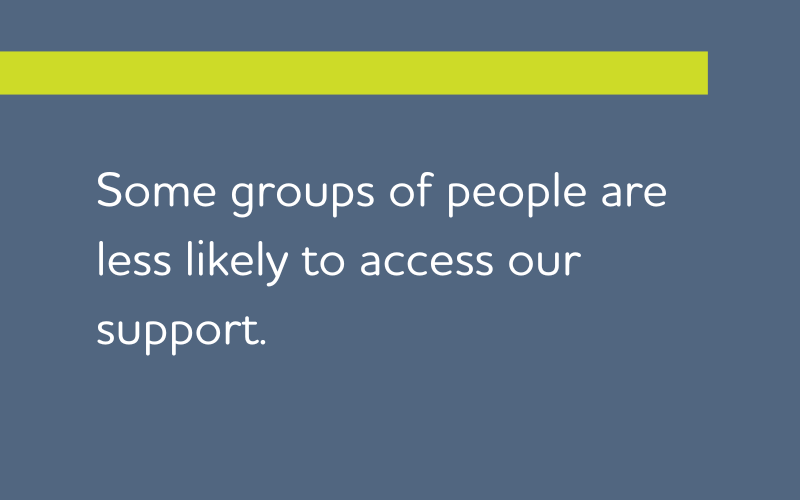
For example, we might not be reaching people who are transgender, people who are bisexual, gay, or lesbian, and people who belong to Black, Asian and mixed ethnic groups.
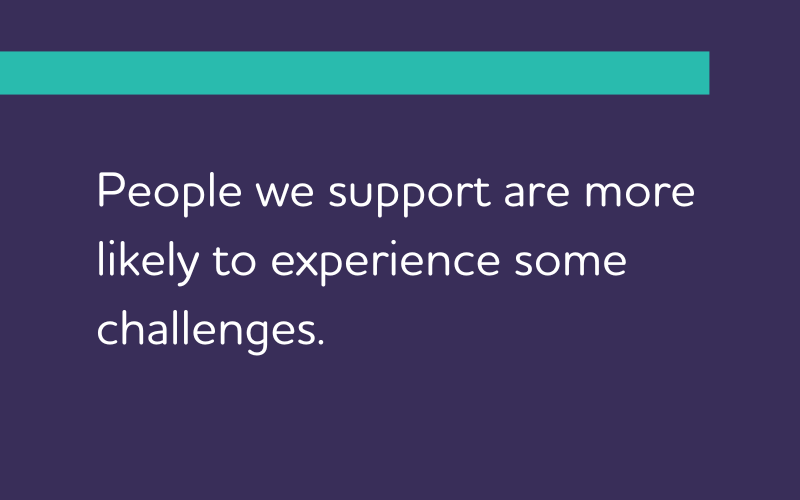
At least 15% of our respondents had difficulties with literacy. 74% of people registered with Future Pathways living in Scotland, were living in some of the most deprived areas. In the wider population, over a third of people who experienced childhood abuse by a family member were also abused by a partner as an adult.
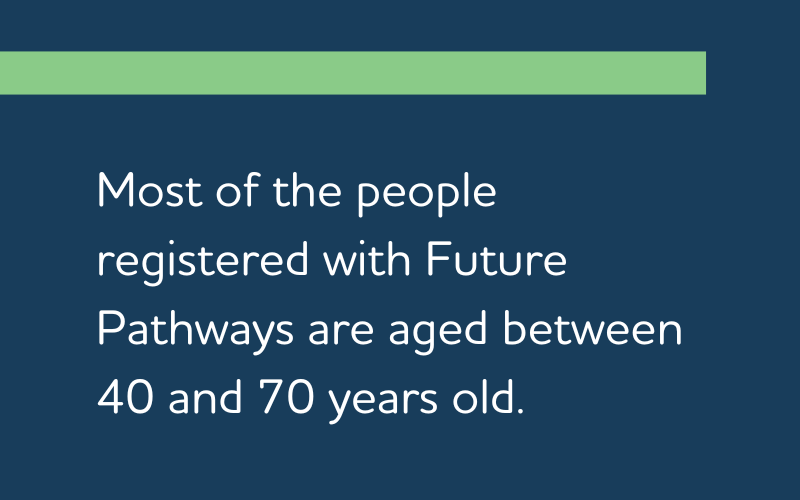
People registered at Future Pathways were aged between 19 and 93 years old, and the average age of people registered with Future Pathways was 52. In the wider population, more older people disclose childhood abuse than younger people.
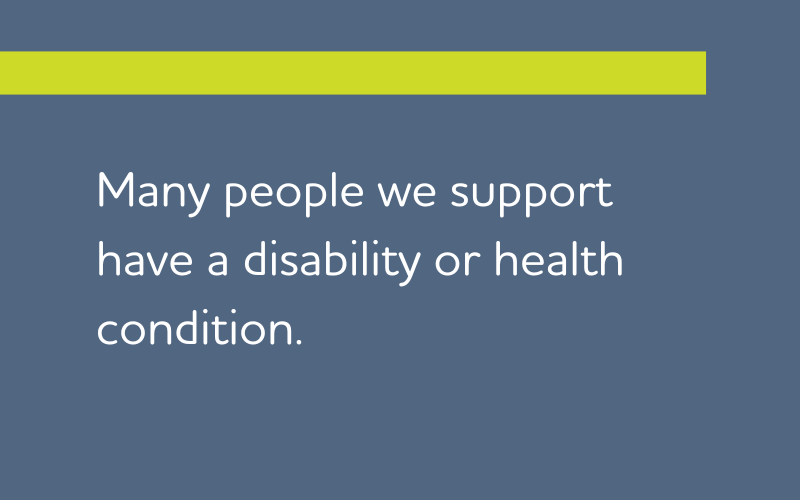
At least 48% of our respondents had a disability. In the wider population, people who experienced childhood abuse are at higher risk of anxiety, depression and psychiatric conditions.
At Future Pathways, we take a trauma-informed approach in our work with people. We know from feedback that people value this approach.
People tell us it is important that they:
- feel safe
- can trust a service or provider
- have choices about what support looks like
- can work alongside a service
- can influence their own support
So, we encourage services we work with to have a trauma-informed approach too.
Below, we give a short introduction to trauma and give a few pointers about things you can keep in mind when working with someone affected by trauma.
If you would like to find out more, download our short guide to Trauma Informed Practice.
What is trauma?
Trauma is when a person experiences something as physically or emotionally harmful or life threatening. Trauma can come from an event, a series of events or an ongoing situation. Not everyone will be affected in the same way.
How might trauma affect people?
Trauma can have a lasting effect on people’s mental, physical and emotional wellbeing and can leave people with a sense that they are not safe in some situations or around some people.
Trauma can affect people in different ways at different times. It can also affect someone a long time after an incident has happened.
Trauma can cause people to feel distressed or fearful. Some people may find it harder to trust people or may struggle to manage emotions. For others, trauma can mean a person might find it harder to look after themselves or they may also live with disabilities or health conditions. Everyone experiences trauma differently.
Things to keep in mind:
- It can be difficult or stressful to have a stranger in the home. The person you visit might choose to have a friend, relative or support worker there on the day to help them manage that stress. It is important that people know they are safe. You may know that you don’t pose a threat or risk to someone else but that person will not know this and may choose to keep a distance from you, maybe even asking the friend, relative or support worker to talk to you for them.
- Some projects might require a group of people to come into the person’s home. The person you visit might prefer to know how many people they can expect and who they are. Where possible, keeping the number of people in the group as low as possible can help the person feel safe in their home. It is helpful to be clear about who will be there and when they will be there.
- If you arrange to meet someone on a certain day or time, you should try to keep the appointment. This also means not arriving late or early. It can be difficult for people to let a new person into their personal space, so being consistent is important. If you can’t make it, give the person as much notice as possible. If you’re unable to give advance notice, please do make a courtesy call on the day you were due to meet (as limited or no communication could cause considerable distress).
- It is important to respect people’s privacy. This means not talking about the details of work you have completed or are completing for Future Pathways clients to anyone who is not involved in the work. Keeping this information confidential builds trust with people.
- It is important that people feel safe enough to make choices that are right for them. Make sure that when the person makes decisions, these are respected.
- Allowing additional time for someone to make a decision can be helpful as decision making can be difficult for some people.
- Boundaries and predictability are important for everyone but even more so for people who have experienced trauma. Please do not discuss your past experiences with the person. It is also important that the relationship is kept professional and that you don’t attempt to make contact with the person other than about issues related to the job.
Want to find out more? Download our short guide to Trauma Informed Practice here.
In this feature, we take a look at our work from 2023, covering January to November. The round-up below shows key information about the work we do, shining a light on who we work with, how they feel and the difference made to people’s lives across Scotland, the wider UK and beyond.
What did we do?
Who did we work with?
We worked with people from all over the world, but most people who registered with us live in central Scotland.
More younger people have registered with us over the last year, and the average age of people registered with us has decreased.
Through our new ‘About Me’ form we learned that people we support are more likely to experience inequalities like homelessness, addiction, criminal conviction, and disabilities and health conditions that affect their everyday life.
We worked with 69 Delivery Partners offering a wide range of different types of support.
How did people feel when they engaged with us?
We learned more about people’s experiences with us through our new feedback forms.
Everyone who gave us feedback on our website felt their experience with Future Pathways was “mostly positive”.
Everyone who gave us feedback after reviewing or ending their support felt understood and cared about by Future Pathways, and that they could trust the service.
Here are words people we support used to describe our service:
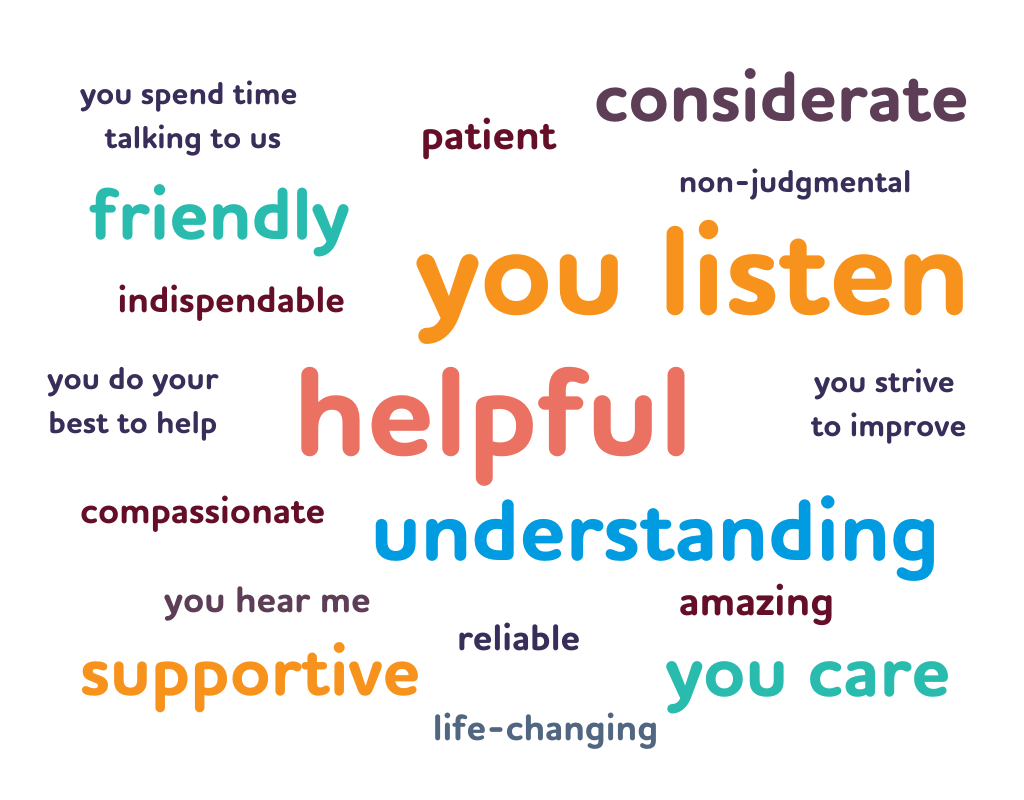
Delivery Partners told us they feel valued by Future Pathways. The most common word Delivery Partners used to describe Future Pathways was “collaborative”. Most Delivery Partners who answered our questionnaire told us that working with Future Pathways was different to working with other services. Delivery Partners told us that our transparent feedback, open-ness to dialogue, and focus on learning and improvement made Future Pathways different.
What did people learn and gain?
Most people who gave us feedback after reviewing or ending their support told us they knew what changes they want to make in their life.
Most people told us they knew more about their strengths and what they can do.
Most people also felt they had opportunities to influence how Future Pathways develops.
Most Delivery Partners who responded to our questionnaire shared they had learned more about the people we support through our work together.
What did people do differently?
Everyone who gave us feedback after reviewing or ending their support felt able to access support that is right for them. Most people also agreed that they have taken steps towards their goals.
Most Delivery Partners told us that they had made changes to how they work with people because of what they have learned through working with Future Pathways.
What difference did we make?
Most people who gave us feedback after reviewing or ending their support felt more independent. Most people strongly agreed that they now feel more hopeful about the future. Some people told us that their life was better overall.

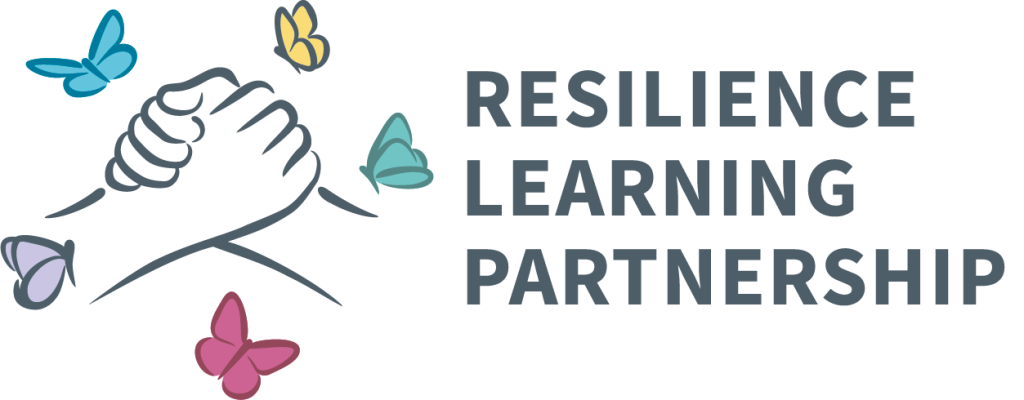
We are delighted to share a new resource from one of our learning partners, the Resilience Learning Partnership (RLP). Together with partners from the National Trauma Transformation Programme, they have created a Roadmap for Creating Trauma-Informed and Responsive Change.
The National Trauma Transformation Programme comprises Resilience Learning Partnership, Scottish Government, COSLA, NHS Education for Scotland and the Improvement Service.
RLP supports the National Trauma Transformation Programme with the development of the mechanisms that help facilitate people with lived experience of trauma being meaningfully involved in the design and delivery (where possible) of services.
View the new publication here – Roadmap for Creating Trauma-Informed and Responsive Change: Guidance for Organisations, Systems and Workforces in Scotland.
This resource is designed to be used flexibly and independently by services and organisations across all sectors of the workforce in Scotland, to help identify and reflect on progress, strengths, and opportunities for embedding a trauma-informed and responsive approach across policy and practice.
The roadmap draws on what people with lived experience of trauma have said would help improve access to support, reduce re-traumatisation, recognise resilience and support recovery, and has input from leaders across services/ organisations have said support them to implement a trauma-informed and responsive approach.
For more information about psychological trauma, its prevalence and impact and the wider work of the National Trauma Transformation Programme, please visit: www.traumatransformation.scot
Flora Henderson, Alliance Manager, explores our relational approach at Future Pathways.
Future Pathways is delivered by the In Care Survivors Alliance. It is one of the two services hosted by the Alliance (the other is Redress Support Service).
Our fundamental purpose is to help people who experienced childhood abuse and neglect in care to live happier, more fulfilled and more independent lives, recognising and being sensitive to the profound impact of traumatic experience – and tailoring support to set the conditions for positive connection and improving quality of life.
Since Future Pathways began, we have taken a relational approach to working with people.
We do this because we know that a positive relationship can be both an outcome in its own right, and a powerful enabler to accessing other supports.
Trust is a hugely important part of this; it is fundamental to making a connection and to building bridges to other supports and resources. This is especially important for people who may have been let down and poorly served by professionals in the past or may have a deep mistrust of services.
We decided, therefore, to centre trust in how we think about and measure the difference we make.
And we decided to be iterative, so we can apply what we learn immediately, constantly aiming to do our best by and for the people we work with.
For a number of years, we have worked with Matter of Focus. Together, we use impact measurement to drive insight and innovation. And by investing in impact measurement, we have an evidence-based way of reflecting on our work, developing the courage to test new ideas and adapting when we need to.
Measuring our impact helps us to consolidate what is most important about our approach in a robust way.
As such, as we now have real confidence in the importance of taking a relational approach, with a strong evidence base about what works and how.
It has helped us take a hard look at what being person-centred and trauma informed means in practice, with effects ripping out across how we work as colleagues, as commissioners of support and as contractors with Delivery Partners, as well as how we respond to feedback and complaints. Our relational approach invites the participation and contribution of everyone who is involved in and benefits from the service.
Measuring the impact of our relational approach has been central to developing an understanding of what ‘good support’ looks like and feels like to people, who have been seldom heard, or well served by existing services.
We are delighted to share our final report from the Action Learning Programme. Created by The Lasting Difference, the report highlights the learning and feedback from engagement sessions held with a group of services we work alongside.
These sessions helped us to:
- Explore best practice and ways to remove barriers to support.
- Explore how partnership working can contribute to lasting change for individuals and the wider system.
- Identify ways to increase collaborative working.
- Inform how we think about our collective impact going forward.
Together we considered the challenges to collaborative working, and how we could address these. We also discussed what supports effective, impactful partnership working.
We found that our collaborative approach to commissioning brings trust, choice and flexibility to our outcomes-focused support. It also creates a network of support, knowledge and learning with Delivery Partners which, in turn, helps navigate complexity and offer holistic support.
We also found that our collaborative approach to commissioning can face systemic challenges. For example, inaccessible services, capacity challenges or confusion around national programmes of support can hinder the way we can work together.
Thanks to the insights from participants, we also learned more about what we do well and where there is room for improvement so we can address challenges to enable wider impact.
We would like to thank all those who took part in the process. Their insight and feedback was invaluable.
“This Action Learning Programme helped us consolidate what we have learned about sustaining collaborative relationships with partners. This project was an opportunity to work with our partners to explore how we can enhance our approach to working together, so we can continue supporting people to work towards their personal outcomes. It highlighted the importance of building ongoing communities of practice, and of evaluating our wider impact.”
Louise Hall, Impact and Evaluation Lead, Future Pathways
“It was so helpful to better understand Delivery Partners’ experience of working with Future Pathways. For me being relatively new to my role, the voices of everyone in the group and the learning that was shared about what works, helped to shape my own approach as partner relationships lead. The opportunities for learning and improvement can’t be overestimated.”
Nell Glen, Partner Relationships Lead, Future Pathways
“People are better supported when the different parts of the system work better together. Future Pathways have shone a light on this by convening partners and exploring how the capacity within the system can be used better. This report shows that more collaborative, trauma-informed commissioning is not only necessary, it’s clearly achievable.”
Graeme Reekie, Director, The Lasting Difference
Flora Henderson, Alliance Manager, explores how working together as an Alliance can strengthen the service we deliver.
Delivered by the In Care Survivors Alliance, Future Pathways was set up to offer something tangibly different to people who experienced childhood abuse or neglect in Scottish care settings. The aim was to directly reduce the inequalities that come from such experiences.
Our vision was for people to have fuller, healthier and more independent lives.
And that this could be achieved by focusing on what was most important to someone and by providing tailored support according to the personal outcomes or goals they wished to progress.
It is known that the impact of childhood abuse is individual and wide ranging. No two people were alike in their experiences, therefore a personal response was vital. Having consulted with people about what was important to them, the challenge was to respond to a wide range of needs in a personal way. It was hard to see how a single organisation could respond.
Early evidence highlighted the importance of this: by the time our first scoping report was completed, it was clear that people usually had multiple needs and few supports. Indeed, we found that people had shown great resilience in the face of services that did not always understand or respond to their needs. More of the same would not do.
In an alliance, each partner is required to act in a certain way to achieve a common goal.
The Scottish Government identified that alliancing had the potential to offer something new and different. The initial test was whether alliancing would enable partner relationships that allowed for a flexible response to individuals. Done well, it is a culture of innovation and learning, with all partners sharing risk as well as opportunities, never losing focus of the person’s needs and requirements.
In Care Survivors Alliance brings together four partners:
While each organisation has specific qualities, experience or remit that we can draw on, we also know that working together enables more effective support for those who access Future Pathways.
Each partner can share learning, knowledge and expertise to strengthen the service we deliver.
Our collaborative approach also extends to our network of Delivery Partners and beyond. These are the organisations, services and individuals from which we commission support. Over time, we have developed and strengthened our network and we now work with around 62 active Delivery Partners. This commissioning model also offers the flexibility to respond to individual need, offer real choice to people and to truly tailor our support. For example, our network includes organisations and practitioners working across counselling, therapy and record searches, as well as in life coaching, or creative writing services.
Our hope was that alliancing would lead us to a style of working that fostered inclusivity and learning.
There is a sense that a consistent priority placed on relationships and learning. There are examples of support being offered in new and different ways, improving the response to individuals.
We have more to learn about the unique contribution that Future Pathways and our partners make in understanding what is most important to someone and convening support around them accordingly.
Collaboration is essential to any alliance model. This is clearly the case for Future Pathways: our aims can only be achieved through the joint working and shared values of our four Alliance partners. We are committed to building relationships, learning from each other and reducing barriers to support where we find them.
We are pleased to share a piece of work created with Matter of Focus. Matter of Focus is a company that helps organisations to look at how they support people to reach their goals.
In 2018, we commissioned Matter of Focus to evaluate our service. This would support our learning and the ongoing development of Future Pathways.
Since then, Matter of Focus have helped us to track, measure and report on our work. They help us to see the difference we make and where we can improve.

Understanding our relationships
The way someone experiences a service (and the feeling they have about this) plays a significant role in how the person benefits from the service. It is important, therefore, to make sure we build effective relationships that foster trust. It is not just about delivering a service, it is about the interaction between us and the people we support.
Understanding the relationships between Future Pathways and the people we support is essential to how we learn. Matter of Focus created a simple framework which helps us to map a person’s journey of support. Through the framework, we consider:
- What we do
- Who with
- How they feel
- What they learn and gain
- What they do differently
- The difference it makes

The framework helps us to think about our service, show where we are making a difference and highlight areas we can improve. It also prompts us to consider the relationships we build. For example, how we build trust and how people respond to us. It also helps us to think about how we can support people in their goals, by considering emotional or practical outcomes.
The framework helps us identify additional context, like the person’s individual sphere (for example, values, habits and skills), their social sphere (such as networks, roles and relationships) and their material sphere (things like infrastructure, time or resources). Considering this additional context helps us to understand the diverse ways people experience Future Pathways. This, in turn, helps us to build and sustain relationships.

What we learned
The research showed how important it is for us to consider, talk about and understand the relationships we have. The evaluation approach from Matter of Focus has helped us clarify how Future Pathways make a difference. Their research also shows that establishing and maintaining trusting relationships with those we support is crucial to creating an environment where a path towards recovery becomes possible. In addition, by being able to use a framework that demonstrates evidence of outcomes, we have been able to make a stronger case for continued funding and ensure continuity for survivors.
In short, this work has shown that it is not just what we do, but how we do it that gets results. This learning is essential for other services too – we encourage partners and organisations to place people’s experiences at the heart of improvement work.

Collaborative research
This piece of work by Matter of Focus looked at the issue of trust and how important this is to the people we work with and to our own staff. Focusing on this specific theme helped to show how the evaluation approach can shine a light on the relationship between Future Pathways and the people we support. It also helped to show how we adapted in response to the findings.
Our collaborative piece has recently been published in Evaluation and Programme Planning, an international journal hosted by Science Direct.
You can find out more about the work and read the full paper on Matter of Focus website.
At Future Pathways, we try hard to provide the best service that we can. We’ve
learned a lot about how to do that since we started in 2016, but there’s more
that we can learn. And there are probably things that other organisations
could learn from us. That’s why we’ve started a new initiative called the
Action Learning Programme.
The programme will last 12 months. It will be led by a group called The Lasting Difference. They are experts in helping organisations like ours to find ways to improve what they do.
Some of the main things we’re going to do are:
- Encourage different organisations to talk to each other and share their experiences of what worked well and what could be improved
- Find some examples of things that people did that worked really well for survivors
- Find ways to tackle barriers that currently make it harder for survivors to get support
Some of the ideas included looking at:
- How important it is that we learn about and share what we do well. This includes looking at how working together with other services can help to make sure the difference we make lasts.
- The benefits of services working together. This includes finding examples of how services have connected with each other to meet people’s needs, and how this can help us to work with more people and to make a bigger difference.
- How to support change and have the biggest impact. This includes looking at small changes that could make a big difference to improve our ways of working and how we work with others.
- Better understanding the people we have not been able to reach or who are not getting the most out of our support, why that is and what we might be able to do to help.
We are working with 9 delivery partners, including MindMosaic Counselling and Therapy, LinkLiving, Health in Mind Trauma Support Service, LifeLink and Robin Trewartha (Independent Counselling Psychologist).
